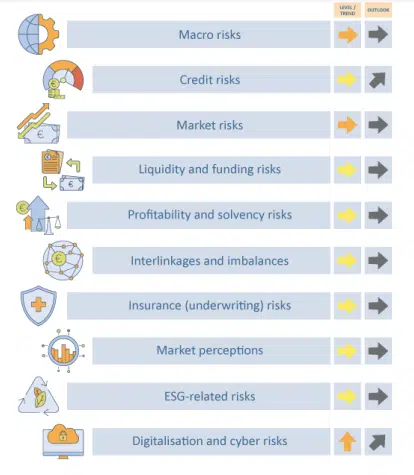Increasing risks of digitization and cybersecurity in the insurance sector

Redacción Mapfre
The risks associated with digitization and cybersecurity for insurance companies continue to escalate, reaching unprecedented levels. According to the Insurance Risk Dashboard recently published by the European Insurance and Occupational Pensions Authority (EIOPA), the frequency of cybersecurity incidents has risen since last year, and it remains a growing concern for the upcoming year.

“The frequency of cyberattacks across all areas of activity has increased since the third quarter of last year, according to publicly available data,” explains EIOPA, warning that negative sentiments regarding cybersecurity have also seen an uptick.
In fact, MAPFRE fell victim to a ransomware cyberattack in August 2020. Typically, such attacks occur when malware infects a company's computer, spreading through the corporate network. The company had foreseen this type of risk, which made it possible to execute response protocols just minutes after the attack began.
The insurer quickly communicated the problem, a transparency that made the Spanish Data Protection Agency (AEPD) positively assess the reaction to the cyberattack, also stating that MAPFRE "had reasonable technical and organizational measures to prevent this type of incident, which has allowed the rapid identification, analysis and classification of the security breach".
Ricardo González García, Director of Analysis, Sector Studies, and Regulation at MAPFRE Economics, explained in the Economics Café podcast that cyber risks can present both business opportunities and limitations for insurers. “There is a lack of data and limitations in predictive models for extraordinary events that allow the calculation of prices and reserves, whether related to cyber risks or natural disasters. Currently, addressing these breaches remains complex and requires public-private collaborations,” says González.
Having said that, digitization also presents opportunities, such as smart contracts based on blockchain technology, that automate the settlement of claims without the need for human intervention, among many other things, as highlighted in ‘Assessing the Potential of Decentralized Finance and Blockchain Technology in Insurance,’ a report edited by The Geneva Association.
However, the study warns that the benefits of these technologies in the insurance sector have not yet materialized. Therefore, The Geneva Association emphasizes that insurers and reinsurers “must carefully weigh the short-term cost of investing in technology against the long-term potential of DeFi and blockchain insurance,” as stated in the report. “They should analyze the pros and cons and continue to explore the field with pilot projects due to the potential of DeFi insurance to disintermediate and transform traditional business models, generating new revenues through enhanced services.”
EIOPA identifies other risks traditionally linked to the insurance sector: macroeconomic risks. The pandemic-induced crisis has given rise to a highly complex economic scenario marked by a surge in inflation to levels unseen in four decades, monetary tightening, and weak growth.
MAPFRE Economics recently published its year-end forecasts, projecting 2.5% growth for Spain in 2023 and 1.3% in 2024, with inflation rates of 3.5% and 2.5%, respectively. For the global economy, the forecast is a 2.9% increase this year and a 2.2% rise next year, with price hikes of 6.6% and 6.1%. “If there are no surprises, such as a spike in oil prices or a financial accident, the central scenario is an economic slowdown but with growth. In other words, there won't be a recession, as is happening in Germany due to structural problems. In Spain, it’s different,” explained the Director of Analysis, Sector Studies, and Regulation at MAPFRE Economics.
González notes that interest rates at current levels and for an extended period will positively impact Life Savings and Annuity products. Additionally, the recent downturn in inflation is good news for the profitability of insurance companies.
Geopolitics: a growing risk for the global economy
From a broader point of view, geopolitics is now one of the most notable risks to the global economy, as identified by MAPFRE Economics in its report 'Economic and Sector Outlook 2023: Outlook to Q4', where it highlights the "real" risk of the conflict in Palestine spilling over into the region and triggering a crisis in the Middle East.
While markets have not experienced significant imbalances since October 7, oil and gold did see a sharp increase in the days following the Hamas attack, maintaining higher levels than before that date. However, the rest of the market experienced a temporary decline but has quickly recovered.
Regarding the conflict between Ukraine and Russia, the report underscores two elements at play, despite the war having reached a stalemate: the potential new government under Donald Tusk and progress in negotiations to define the post-war situation.



